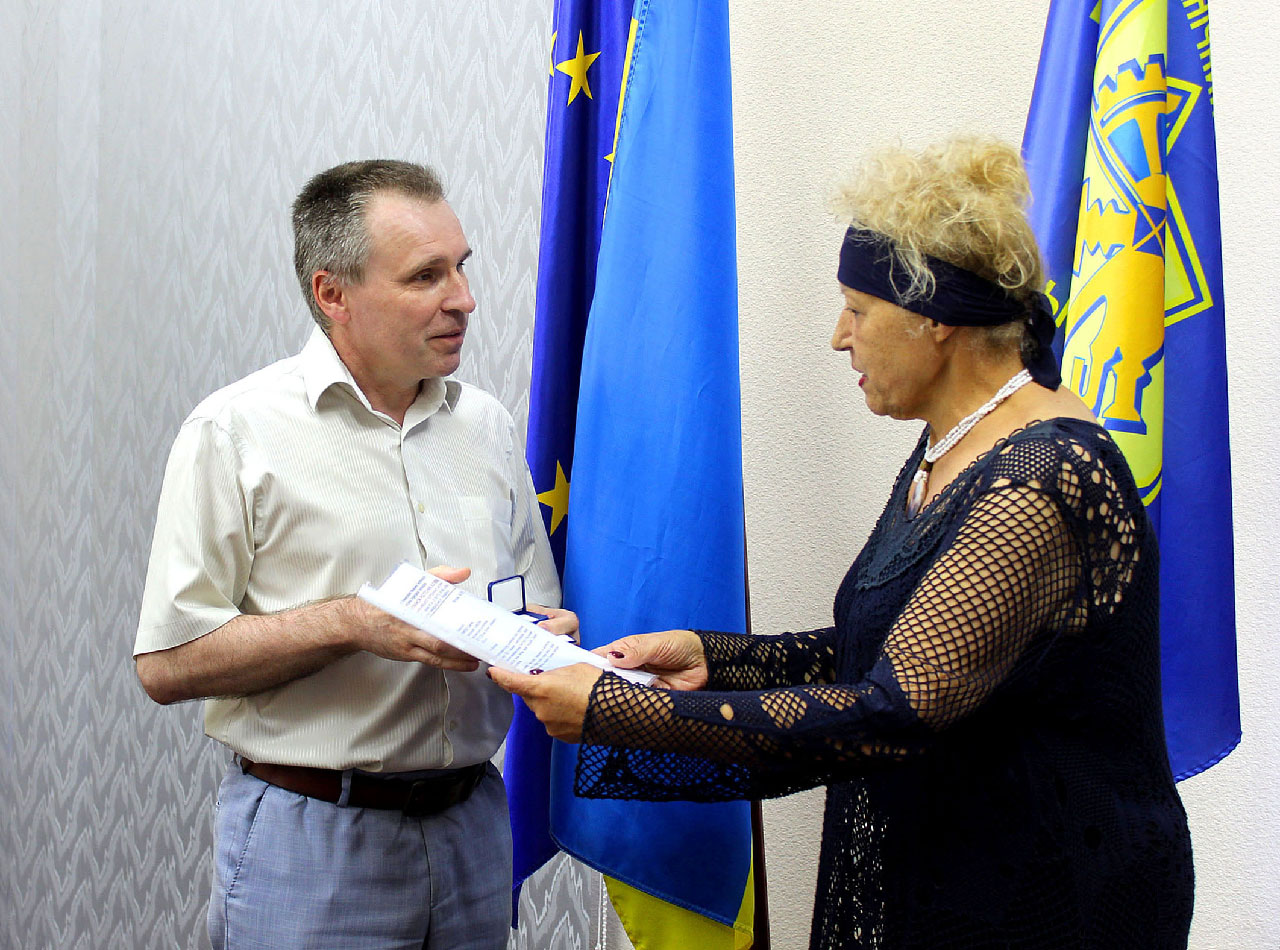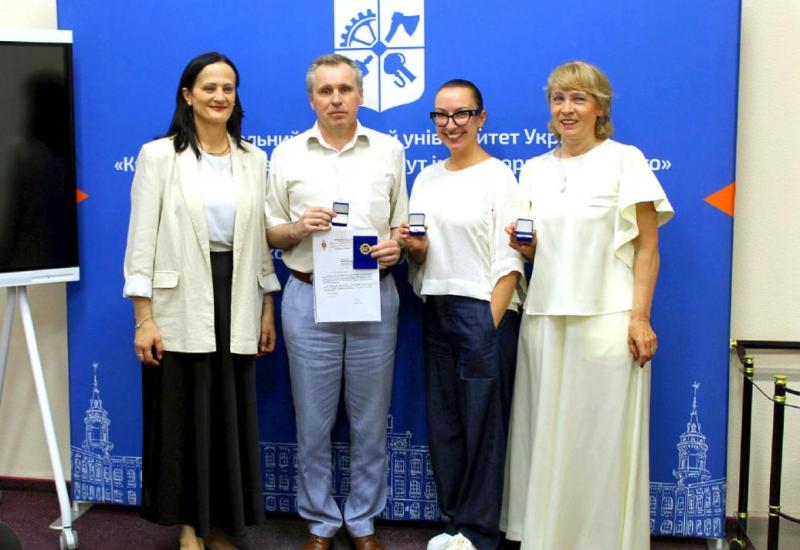On June 18, the university held an award ceremony for the Golden Honorary Badges of the National Technical Organization – the Federation of Scientific and Technical Societies of Poland. This year, they were awarded to Professor Lyudmila Mykhailivna Shulgina of the Department of Industrial Marketing, FMM; Professor Serhii Vasylovych Voitko, Head of the Department of International Economics, FMM; Director of the Educational and Scientific Institute of Energy Saving and Energy Management Professor Oksana Oleksiivna Vovk, and former Director of the G.I. Denisenko Scientific and Technical Library Oksana Mykolaivna Bruy. In a solemn atmosphere, the awards were presented to Kyiv Polytechnic Institute students by Dorota Jaworska, Deputy Head of the KPI Alumni Section in Poland. Below we publish an article by this year's recipient of the NOT Gold Medal, Serhii Voitko, about his experience of cooperation with Polish colleagues.
🔵
I recently received an official letter informing me that I had been awarded the “Golden Badge of the National Technical Organization” (Golden NOT Badge) by the Federation of Scientific and Technical Societies of Poland. I was pleasantly surprised. In a matter of minutes, my 20 years of cooperation with Polish colleagues flashed before my eyes. Here is a brief overview.
Back in 2002, the Department of Economics and Organization of Machine Building Production was renamed the Department of International Economics in connection with the launch of training in international economics at KPI. From the very beginning, the department staff, led by Doctor of Economics, Professor Vasyl Herasymchuk, actively engaged in the development of international cooperation. Incidentally, Vasyl Hnatovych was also awarded this distinction.
One of the steps was the opening of the Center for Ukrainian-Polish Cooperation at the department on November 14, 2003. The first activities within the framework of the Center were the organization and holding of four contact seminars-meetings of entrepreneurs from the Republic of Poland and Ukraine over two years. This was a valuable experience both for the faculty members and for the international relations students who were directly involved in the preparation and support of this series of seminars.
In 2003, I was sent to Poland with students from the Faculty of Management and Marketing, where we familiarized ourselves with the educational activities of the Higher School of Business in Novy Sonch, attended lectures, familiarized ourselves with the work of the library, talked with students, visited leading high-tech enterprises in Poland, and visited the Royal Wawel Castle in Krakow. Later, we hosted a delegation of Polish students and teachers from this university at KPI. Then, over the decades, there were many other events.
Recently, my cooperation with Polish colleagues has focused on the Poznan University of Technology. The first meeting was held as part of the Erasmus+ project with Oksana Erdeli in 2019. Subsequently, meetings were organized between Oleg Gavrysh, Dean of the Faculty of Management and Marketing, and the then Dean of the Faculty of Sociology and Law, and now rector of our university, Anatoliy Melnychenko, with representatives of this Polish higher education institution, in particular with Magdalena Wirwicka, dean of the Faculty of Management Engineering at Poznan University of Technology.
The scientific sphere also developed. As part of the expansion of international cooperation, a second foreign scientific supervisor was appointed for a postgraduate student of the Department of International Economics, a joint Ukrainian-English-Polish dictionary on the discipline “Transnational Corporations” was prepared and published, and joint reviewing of textbooks, scientific articles, and other activities is being carried out. Several seminars and round tables have already been held, including the International Scientific and Methodological Seminar “Human, Social, and Economic Aspects of Crisis Management,” the International Scientific and Practical Round Table "Formation of Management Systems and State Policy in the Field of Increasing the Resilience of Local Communities to Counteract Emergencies at the Local Level: Ukrainian-Polish experience," etc. The Dean of FMM, Doctor of Economics, Professor Maryna Kravchenko, continues to develop cooperation between the countries.
 In the photo: D. Yavorska presents the award to S. Voitko
In the photo: D. Yavorska presents the award to S. VoitkoRussia's full-scale invasion temporarily suspended scientific cooperation, but Poland's invaluable assistance touched my family. My wife and younger son, fleeing the horrors of war, ended up in the city of Poznań. It is difficult to recall this... their journey took 50 hours. However, the city welcomed them warmly. A Polish family provided my family with a separate room with amenities in their private home. They assisted them as much as possible with paperwork and did everything they could to help them forget the air raid sirens and the sound of fighting near Kyiv. With their support, the Institute of Molecular Physics of the Polish Academy of Sciences awarded my wife a grant in her field of metallophysics, thanks to which she successfully worked for the development of world science and the implementation of the institute's research topics. Everything turned out well because my colleague, Yevhen Revtiuk, supported my wife and gave her his own laptop to work on. After the security situation improved, our families reunited. To this day, our families keep in touch. Our Polish friends worry about us when they hear about rocket and drone attacks on Kyiv.
Yes, the war has made adjustments to scientific activity. In 2023, the Department of International Economics, together with the Poznan University of Technology, applied for a grant from NATO's Science for Peace and Security program to “Improve the capacity of local communities to respond to crisis situations” and received funding for three years. Now we have other activities that are necessary during the war. Kyiv and Poznan Polytechnic Institutes are jointly implementing this project with the aim of resolving crises, improving the ability of authorities to anticipate negative situations (threats, accidents, failures, disasters), preparing resources to eliminate them, and ensuring the legitimacy of governance and a broad understanding of the resilience of local communities.
I sincerely thank the Polish people for their high assessment of my international activities and support for our country and our people in achieving victory in the Russian-Ukrainian war.

